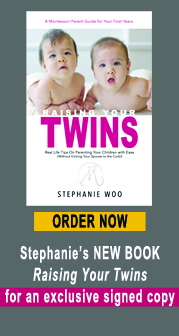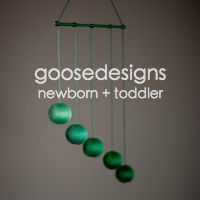Sleeping Through The Night
The methods described here are best for infants after they are 8 weeks old.
Some say it’s because they’re girls. Some say it’s because they’re twins. Some people say I’m just lucky. What I know is this: in my 20s, I watched my siblings and their spouses raise my 6 nieces and nephews. All of them slept through the night on their own by 2 months. And the source was my mother, Ms. Lam, who has worked with thousands of children of all ages. Having seen these methods repeated over and over, I knew it wasn’t a fluke. I came to see that it was possible, but most importantly, this is what I WANTED. I value my sleep, I need it and I knew I wanted my babies to sleep through the night. So I became a very good student.
In the first six weeks, I did what they teach you in hospitals: feed on demand. Brooke was a hungry baby from the day she was born (she still is!). Starting week 3, she started doing what’s called cluster feeding. It’s when a baby wants to feed constantly over a period of 4-6 hours. They eat, fall asleep and five minutes after you put them down, they cry wanting to eat again. This meant every night from 5pm-12, I knew to expect this and I did nothing during that time but breastfeed. Not to mention Mackenzie also needed to eat. So I was, on average, breastfeeding 16 hours a day (up to 20 hours). I was exhausted. When I researched the internet about cluster feeding, they said, “very common among infants,” “usually they stop this behavior when they are 3 months.” THREE MONTHS? I cried. How was I going to go on like this for another THREE MONTHS?
Then my sister-in-law and brother came to visit. And they immediately set me straight. They gave me some tips that immediately changed the babies feeding behavior.
RULE #1: Do not feed a baby until he/she is VERY hungry.
Cynthia told me Brooke was seeing me as a 7-Eleven and was coming to snack throughout the day, especially during those evening hours. If you snack on potato chips all day, you’ll never be hungry at your meals!
“Well, what do you do when my baby starts crying ‘cause she’s hungry?” I asked.
HOW
FIRST, DISTRACT THEM.
If your baby can be distracted and stops crying when you distract him, this means he is not REALLY HUNGRY. If you feed them when they are not truly hungry, they’ll just drink a little and then a short time later, they’ll want more. But if you wait to feed them when they are truly hungry, they will much more efficient drinker and will sleep for longer periods in between feedings. So if you want your babies to sleep through the night, you must learn to be very good at distracting them! My brother gave me an excellent demonstration when Brooke started crying from hunger. When your baby is crying from hungry, try any/all of the following:
- Change positions. Hold them up, hold them sideways, hold them facing in, hold them facing out. Stand up, sit down.
- Change environments. Go to a different room, go outside of your house (we have a little backyard so that always worked because it was colder outside and the change in temperature always made them stop crying)
- Give them a bath.
- Dangle something loud and shiny in front of them, like keys
- Dangle a toy or rattle in front of them
- Make funny faces at them
- Talk to them
- Sing to them
As soon as one method no longer works and they start crying again, try another method. When a baby is REALLY hungry, there is NOTHING you can do that will distract them.
They will REALLY cry. That is your cue to bring out the boob/bottle.
My Implementation
The first time I tried this was at dinner. I gave Mackenzie, who was quiet, to Daddy and I worked with Brooke. It was hard because when she is hungry, she screams on the top of her lungs. But I held on: when she cried, I moved around, I rocked her, changed position, went outside, rocked her some more, changed more positions, etc. I lasted 25 minutes. It means normally I would have fed her right away, but I was able to distract her for 25 minutes before feeding her. And then the miracle began. Normally, Brooke will eat and fall asleep at the boob after about 10 minutes, but now she was HUNGRY! And she sucked and sucked and sucked like her life depended on it. And she ate for about 5 extra minutes (mothers know that is a long time) longer than she would have. Then she fell asleep and did not wake up for 3 hours. OMG, that was a miracle for me. Brooke, who normally slept 5-10 minutes at a time in the evenings, was down for 3 hours.
Result
In one day, the cluster feeding stopped. And they started eating about every 3-4 hours. We never put them on a schedule, but by feeding them this way, they naturally developed their own internal schedule.
(I remember two days later thinking to myself, omg, I’m not breastfeeding, I have all this extra time, what should I do with myself?! I even posted this thought on my facebook status. And then I remembered: Hello, go to sleep and recover from just having given birth!))
RULE #2: Don’t let a baby fall asleep while eating.
HOW
Turn on all the lights, take off all their clothes, tap them on the cheek, massage their legs, wake them up. Cynthia says, when they eat, it should be BRIGHT LIGHTS, BIG CITY. They’ll still fall asleep, but do your best to keep them awake.
RULE #3: Feed them till they’re full.
HOW
Follow up a breastfeeding session with a bottle of pumped breastmilk or formula.
My Implementation
I have relatively thin breastmilk and don’t have lots of it at one time. If they only drink till they’re no longer hungry but not very full, they will wake up earlier. Starting at six weeks, I started supplementing. I would feed them breastmilk and then when they’re done, burp them and then offer them pumped breastmilk or formula in a bottle.
Result
This was a huge milestone because overnight, at six weeks old, they started drinking a lot more and their feedings stretched to every six hours.
Other tips
- Even if one day your baby surprises you and sleeps several extra hours, don’t assume they are hungry the second they wake up (like I did!) Like my mother and Cynthia told me, do not feed them till they are hungry, crying and cannot be distracted!
- You cannot overfeed an infant under two months. They have an in-born instinct to drink till they’re full and not more. So feed them till they no longer want anymore. Then burp them and offer the boob/bottle to them again. If they don’t want anymore, they’ll let you know.
- Babies who drink a lot per feeding gain weight faster than babies who snack throughout the day. My twins came out at 5 lbs and 6 lbs, they were 11 lbs and 12 lbs by 8 week. They are now 3.5 months and weigh 14 pounds.
How to Discourage Middle-of-the-Night Feedings
At around 9 weeks, they were feeding regularly every six hours. This meant I was still getting up in the middle of the night to feed them. And then my mother gave me the following tip to discourage night feedings.
RULE #4 Discourage middle-of-the-night feedings
HOW
If you don’t want your baby to wake up for night feedings, start by diluting the milk by 75%, then 50% the next day, then 25% the day after, till you are only giving them water at night. DO NOT BREASTFEED in the middle of the night. Babies will wake up just for the comfort even if they are not hungry. Only give them a bottle. And make the water/milk somewhat cold. Don’t talk to them. Feed them and put them down immediately after burping them. Make the exchange somewhat mechanical to discourage them from continuously waking up in the middle of the night to feed. Of all these, most importantly, do not give them the breast in the middle of the night.
My Implementation
I used to breastfeed in the middle of the night, because it was so convenient. I can BF lying down and sleep while the baby drinks, which is much needed when you’re sleep-deprived. I’m sure lots of moms can relate. But this is precisely why they keep waking up because it’s so warm and comfortable to drink mama’s milk while lying in the cozy bed together! Not only does the baby love it, so does Mom! So if you are one of those mothers and it works for you, then keep doing it. This advice is for mothers who want their children to sleep through the night.
I started at 9 weeks. When one started crying in the middle of the night (anytime between 12am-6am), I didn’t breastfeeding and instead, I gave them diluted cold formula. I didn’t talk to them, just fed them, burped them and put them down and went to sleep. When they woke up anytime after 6am, they got completely different treatment. They got the breast or got warm pumped breastmilk. Mama would praise them, smile at them and play with them!
Result
I guess they didn’t like cold diluted formula and the silent treatment, because in about 3 days time, they no longer woke up between 12 and 6am! By 10 weeks, they were sleeping from 9pm-6am. By 12 weeks, they were sleeping from 7:30-7:30. And now at 3.5 months, that’s their schedule!
If you need a consultation…
I really grasped this method after seeing my brother demonstrate in person what it means to “distract” a baby. Also, I went back to my mother a couple times over the weeks to get additional coaching and support. If you are still unclear after reading this post, schedule a consultation with me in person or over the phone (usually, I can answer most sleeping questions over the phone) and I will help you adjust to your specific situation. To schedule a consultation, click here.







